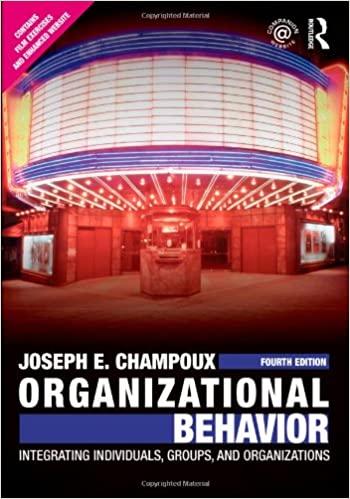Discuss the stages of group development. What behavior or events does each stage emphasize? Reflect on your
Question:
Discuss the stages of group development. What behavior or events does each stage emphasize? Reflect on your work experiences. Discuss examples of each stage.
STAGES OF GROUP DEVELOPMENT
All types of groups (face-to-face, virtual, and self-managing teams) can develop in a series of stages, with each stage emphasizing something different. Early aspects of development focus on the social structure of the group: norms, social status, roles, and role relationships. Each stage has different implications for member behavior and group performance. The stages are not discrete, clearly identifiable states. They are plateaus in the group’s evolution from beginning to end. Groups of strangers that have not done the group’s task before are most likely to experience all stages of development.
The stages of group development are a controversial area of group and group dynamics research. Little research has examined the stages in organizational settings. A conservative conclusion from the research evidence says the stages apply only to newly formed groups. That conclusion suggests that knowledge about group development could be especially important in an organization that deliberately uses groups to do work.
During the group formation stage (forming), group members meet each other for the first time and learn about the group’s tasks. The group defines its social and task boundaries. People who have never been together before introduce themselves to each other. They reveal their characteristics and abilities to other group members, sometimes slowly. The members also discuss preliminary ideas about how to do the group’s task.
The intragroup conflict stage (storming) begins to evolve. Discussions focus on behavior, roles, and social relationships that are right for doing the group’s task. Informal leaders begin to emerge, even if a formal leader exists, as is often true for a formal task group. Power struggles might erupt between competing informal leaders. Conflict arises about how the group should do its tasks. People often struggle to keep their identity and autonomy as the group tries to give an identity to the individual. New members entering an existing cohesive group experience the power and force of the group’s socialization process at this stage.
By the group cohesion stage (norming), the group has defined its roles and role relationships. The group agrees about correct member behavior. Members accept each other, and an identifiable group culture emerges. Conflict is less intense at this stage than during the preceding stage. If conflict is accepted as part of the group’s norms, the group defines acceptable conflict behavior. The conflict at this stage focuses less on the social structure of the group than on different ways of doing the group’s task. The way group members perform their tasks might be evaluated. Conflict can arise if an individual sharply deviates from the group’s norm about task behavior.
Group members become comfortable with each other at the task orientation stage (performing) and have accepted the group’s norms. Members have settled upon their goals and worked out their division of labor. The task or tasks are now defined, and energy focuses on doing the group’s work.
Some groups reach their goals, disband, and end their existence as an identifiable group (termination or adjourning stage). Other groups redefine their task and membership. If either event happens, the group returns to the first stage of development and restarts the process. Functional groups and cohesive informal groups reach the task orientation stage of development and plateau there. Under certain conditions, such groups repeat the stages and experience redevelopment. When newcomers join an established group, the group’s social structure and ways of doing its task often are altered. Established members of the group, especially formal or informal leaders, socialize the new member to the group’s norms. All the forces and dynamics of socialization processes come into play for the newcomer. Organizations that undergo a major redesign often redistribute existing organization members into new formal groups. The people are not new to the organization, but they are new to the groups in which they find themselves. The stages of group development repeat as groups affected by the reorganization try to redevelop.
Step by Step Answer:

Organizational Behavior Integrating Individuals Groups And Organizations
ISBN: 9780415804646
4th Edition
Authors: Joseph E. Champoux





